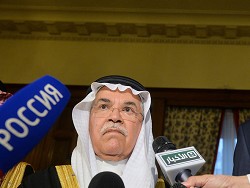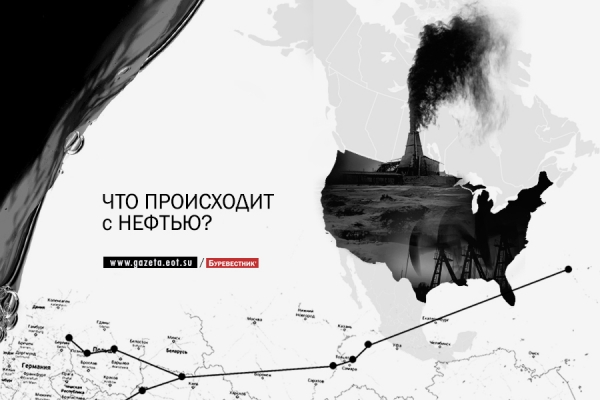
Saudi Arabia is ready to capture the level of oil production, even if it refuses to do in Iran. Final negotiations on freezing takes place on 17 April in Qatar. However, experts do not believe in their success, because if Iran will not support the initiative, it would mean that other players will simply concede its market share of Iranian oil.
Russia and Saudi Arabia have agreed about freezing of oil production. It is reported on Tuesday “Interfax” with reference to a diplomatic source in Doha, where 17 April there will be a meeting of OPEC and producers outside the cartel (primarily Russia). The meeting will be dedicated to the question of fixing the level of oil production.
Saudi Arabia has said it will decide on freezing regardless of Iran’s position on the issue.
While still in early April, Deputy crown Prince and defense Minister of Saudi Arabia Mohammed bin Salman stated that the SA will not be to freeze the prey, if you do not do other major manufacturers — first and foremost Iran.
In mid-February 2016, Russia, Saudi Arabia, Qatar and Venezuela have agreed on a fixed production level of January.
With growing demand this has reduced the glut of oil on the world market, which was the driver for price increases.
However, although OPEC and a number of other countries (e.g., Oman and Bahrain) supported the initiative, no specific agreement was concluded and was not.
Later Iran, who initially expressed support for the idea of the freeze, said he was ready to capture the prey only after will be released on desanctions the level of production (sanctions by the US and EU that restrict including exports, and hence production of Iranian oil, have been cancelled on 16 January).
Now Iran wants to increase production to 4 million barrels. a day (now the country produces about 3.2 million barrels). And this despite the fact that now the excess supply is estimated at about 1.5 million barrels. a day. The head of the Russian Ministry of energy Alexander Novak said earlier that the Islamic Republic of Iran can be granted “special conditions”. If Novak said the halt in production makes sense and without Iran’s participation, since the initiative was supported by countries providing 73% of world production.
On Tuesday, Alexander Novak said he expects the meeting in Doha with optimism.
Earlier, the market experts pointed out that freezing the prey at the January levels for most oil producers won’t be a problem, since in January most of the leaders were at the maximum (except Iran). Novak last week reiterated that we are talking about January, but admitted that could be considered suggestions for fixing at the level of February or March. “If these proposals will go”, — said the Russian Minister.
Russia in January, and in February produced about 10.8 million barrels. a day. First Deputy Minister of energy of the Russian Federation Alexey Teksler last week said that the Ministry of energy monitors the level of production taking into account the agreements about the freezing.
According to OPEC, in February oil production in member countries of the organization changed in different directions. The leader of the cartel, Saudi Arabia had reduced production in comparison with January by 9.8 thousand barrels. a day to 10.2 million barrels. Next is Iraq, where production has dropped by 317 thousand barrels. and amounted to 4,458 million barrels. a day. Closes the three leaders of Iran with 3,385 million barrels. on the day (+15 thousand Barr.)
Mining Kuwait in February remained unchanged (3 million barrels. per day), significantly reduced the production of the United Arab Emirates — to 353.9 thousand barrels per day, to 2,78 million barrels. Decreased production in Venezuela, to 2,529 million barrels. (-28,6 thousand barrels). And here, for example, Nigeria has increased its production to 123.7 thousand barrels. a day, to 1,881 million barrels. The following volumes Angola reduced production by 3 thousand barrels per day, to 1.767 million barrels. Algeria, with its 1,125 million barrels. increased production in comparison with January of 2 thousand barrels. One of the initiators of freezing, Qatar, increased its production by 54.2 thousand barrels per day, to 692 thousand barrels. Ecuador in February was mined 559 thousand barrels. a day (+24,7 thousand Barr.) Data for Libya and Indonesia are not listed.
Most experts, including senior analyst in the oil and gas sector of the company “Aton” Alexander Kornilov, considered at the current prices and volumes of production the development of shale oil in the US becomes unprofitable and will be gradually phased out. Not much will improve the situation for “shale” companies, even a small price increase, for example up to $50 per barrel. This means that the market, there is initially a balance of supply and demand, and then the excess of demand, said the expert.
Still, at current levels of volatility, the market tries to find a new trend, based on statements and forecasts of the major market makers of the oil market represented by the Minister of petroleum industry of Saudi Arabia Ali al-Naimi, heads of BP, Shell, Rosneft and Exxon.
So, on expectations of results of the meeting in Doha oil on Tuesday rose to $44,48 per barrel. (Brent, data at 20.30 Moscow time on Tuesday). The last time the quotes were on a similar level at the end of November last year.
The growth of Brent, the price of which is linked to the price of Russian oil Urals, has led to some strengthening of the ruble. The U.S. dollar the Central Bank on 13 April 66,34 rubles, while the 12 th he was 67,12 RUB.
However, the Doha negotiations may come to naught. If Russia and SA have agreed to freeze production, not taking into account the Iran, it means that they have agreed to give Iran some of its market share, according to the partner of company Rusenergy Mikhail Krutikhin.
Earlier Iran already has announced its intention to sell its oil in Africa at a price lower than that of the oil of the Saudis. In addition, IRI offers discounts to China, Taiwan and South Korea.
“In Europe actually, Iran is selling its “hard” oil at $17 per barrel”, — said the expert.
That the meeting in Qatar is unlikely to be agreement on freezing, indirectly evidenced by the fact that a number of key manufacturers intend to increase production. Thus, the head of Kuwait Oil Co. Jamal Jafar just said Tuesday that Kuwait plans to increase production from the current 3 million barrels. a day to 3,165 million barrels. However, according to him, it will be done later in 2016 or in 2017.
The CEO of the state oil company of the Iraqi Falah, Alamri Tuesday said that Iraq supports the initiative by freezing, as it is the only way to keep pictures. However, Iraq continues to increase production, in March, she reached 4,55 million barrels. a day.








